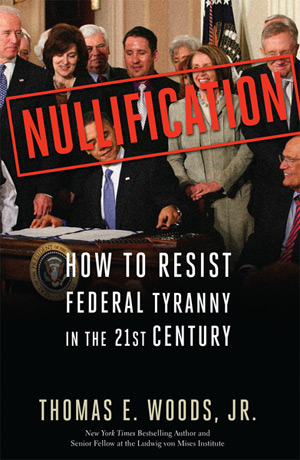- Details
- Category: Recommended Reading Recommended Reading
- Published: 18 September 2010 18 September 2010
- Hits: 4669 4669

After reading the United States Constitution, what is the next thing you should read in terms of thinking about the U.S. Constitution? My bet is on Thomas Woods' new book, Nullification: How to Resist Federal Tyranny in the 21st Century (Regnery, 2010). Nullification is a cherished component of american political thought, although it has been ignored for some time. In a nutshell, the idea of "nullification" is rooted (in a U.S. context) in the U.S. Constitution. The States gave certain enumerated and specified powers to the federal government. Thus--at the human level--power flows from the individual states and the people to the federal government. That is, the federal government receives its marching orders--its power--from the states. "Sovereignty"--in the political sense, and at the human level--resides in the individual states and the citizens of the various states. So what happens when the federal government usurps power, or tries to, and enacts legislation which goes beyond its enumerated and specified powers--powers granted to the federal govenment by the states? Well, the various states are duty bound to simply say, "Nice try, but you have overstepped your bounds. We simply cannot, and are morally bound not to, enforce such a law." It is not simply that the states can ignore such federal laws, the states are--ultimately--duty bound to ignore such laws, in order to protect the citizens of the states who granted and delegated such powers in the first place. But let Tom Woods walk the reader through the issues. His book contains some 125 pages of appendices with primary source documents showing the treasured place of nullification in the history of american political thought. For those who do better with a lecture, you can find a good lecture by the author, Tom Woods, here. Enjoy.